(HQ Online) - The number of processing and export manufacturing enterprises carrying out procedures at the Customs Branch managing processed goods - Ho Chi Minh City Customs Department in 2023 decreased by more than 31% compared to 2022, with only about 1,200 enterprises remaining.
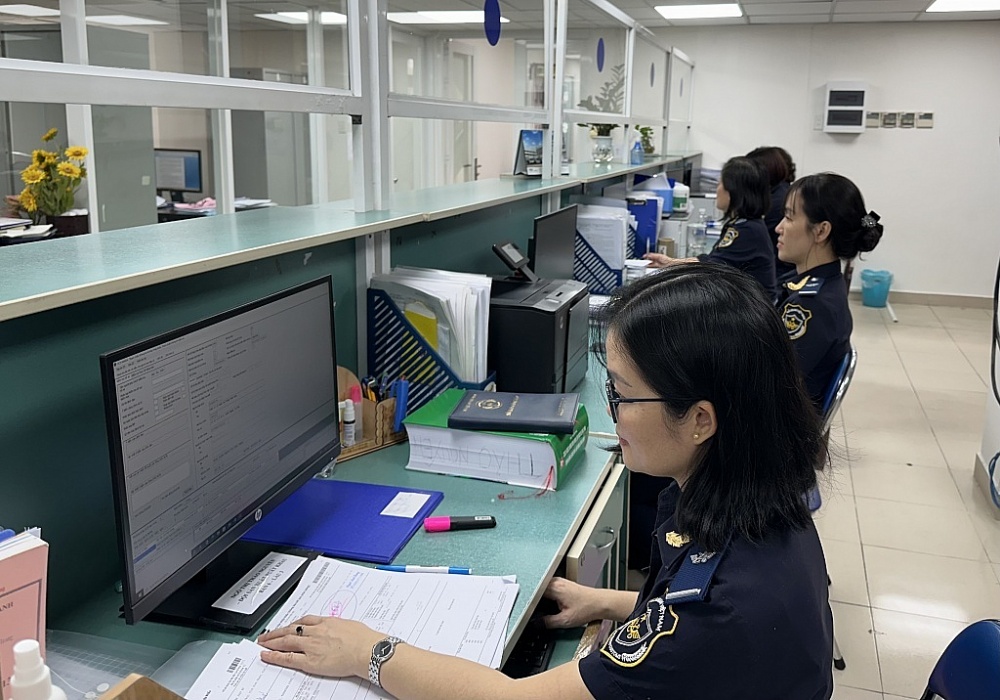 |
| Professional activities at the Customs Branch for processing goods management - Ho Chi Minh City Customs Department. Photo: TH |
Economic hardship affects businesses
Once one of the few leading enterprises in the textile and garment industry in Ho Chi Minh City, in recent years, due to the difficult production situation due to the impact of the Covid-19 epidemic, Gia Dinh Textile and Garment Joint Stock Company has encountered difficulties due to lack of export orders, operating at a standstill, and falling into a situation of tax arrears. At the end of February 2024, the Ho Chi Minh City Tax Department issued an official dispatch requesting the Investment Goods Customs Branch (Ho Chi Minh City Customs Department) to apply compulsory measures to stop customs procedures for exported and imported goods of Gia Dinh Textile and Garment Joint Stock Company, because this company has overdue tax debts of 90 days from the date of the deadline for payment according to regulations, with a total debt of over 97.7 billion VND. According to the enforcement decision of the Customs authority, Gia Dinh Textile and Garment Joint Stock Company must temporarily stop procedures for exporting and importing goods from March 6, 2024.
In recent times, many enterprises operating in the field of processing and export production have encountered difficulties in production and business activities. The number of processing and export production enterprises carrying out procedures at the Customs Sub-Department for Processing Goods Management - Ho Chi Minh City Customs Department in 2023 decreased by more than 31% compared to 2022, with only about 1,200 enterprises remaining.
Analysis by the Customs Sub-Department of Processing Goods Management shows that in 2023, import and export activities of enterprises encountered many difficulties, with turnover decreasing compared to the previous year, especially imported raw materials decreasing by nearly 15%, reaching only nearly 3 billion USD; export turnover decreased by nearly 5%, reaching over 5.1 billion USD. The reason for the decrease in turnover is due to the difficult economic situation affecting the operations of enterprises. Many enterprises are operating at a standstill, without export production orders.
According to the Ho Chi Minh City Customs Department, the main export and import items of processing and manufacturing enterprises for export are cashew nuts, garments, seafood, wood products, plastic beads, handbags, footwear, iron and steel, agricultural products, garment materials, footwear materials, etc. In particular, the items with large turnover are: cashew nuts, seafood, garments, garment materials, footwear materials.
Faced with difficulties of enterprises, the Customs Sub-Department managing processed goods has implemented many solutions to maintain smooth import-export activities in the context of difficult economic situation. At the same time, proactively receiving difficulties of enterprises through channels: phone, email and promptly handling them for enterprises or reporting, advising superiors with difficulties beyond their authority to be resolved, promptly removed for enterprises.
Recommendations for removing obstacles in raw materials
According to the reflection of some enterprises producing and exporting agricultural products, during the implementation process, enterprises encountered difficulties in handling imported raw materials when the export market fluctuated. Specifically, enterprises imported raw cashew nuts to make export products.
cannot carry out procedures for domestic consumption transfer due to being stuck with specialized management regulations according to Official Dispatch No. 906/BVTV-ATTPMT dated April 5, 2018 of the Plant Protection Department ( Ministry of Agriculture and Rural Development ). Currently, enterprises producing and exporting agricultural products (cashew products) are facing difficulties when they are not allowed to change the purpose of use for imported raw materials for export production originating from some African countries. According to regulations, in order to be able to open a customs declaration for domestic consumption transfer, enterprises must complete food safety inspection of imported raw materials. However, African countries from which enterprises import raw materials are not on the list of countries, territories and organizations and individuals allowed to export products of plant origin to Vietnam according to Official Dispatch No. 906/BVTV-ATTPMT, so the food safety inspection agency does not accept inspection for these cases.
In fact, the number of enterprises importing cashew materials from African countries is very large. Before the Covid-19 pandemic, these enterprises had stable export markets, otherwise they could still export to the Chinese market by road. However, since the outbreak of Covid-19, due to the general difficult situation in the world , enterprises have had difficulty finding export markets for their products. On the other hand, cashew products, if left for a long time, will be of poor quality and unusable, and enterprises cannot transfer them to domestic consumption because they are not inspected for food safety, leading to a situation where some enterprises arbitrarily consume them in the domestic market to recover capital, repay bank loans, and minimize losses. The cases of violations by enterprises discovered by the Customs Sub-Department of Processing Goods in recent times have mostly been violations in the arbitrary handling of imported raw materials.
Based on the above reality, as well as from the recommendations of enterprises, to facilitate enterprises, the Customs Sub-Department of Processing Goods Management recommends that specialized agencies allow enterprises to register for food safety inspection when enterprises need to change the purpose of use for cashew products of African origin to remove difficulties for enterprises, avoiding violations that occur due to enterprises being in a dead end.
Source




![[Photo] General Secretary To Lam attends the conference to review 10 years of implementing Directive No. 05 of the Politburo and evaluate the results of implementing Regulation No. 09 of the Central Public Security Party Committee.](https://vphoto.vietnam.vn/thumb/1200x675/vietnam/resource/IMAGE/2025/5/19/2f44458c655a4403acd7929dbbfa5039)
![[Photo] President Luong Cuong presents the 40-year Party membership badge to Chief of the Office of the President Le Khanh Hai](https://vphoto.vietnam.vn/thumb/1200x675/vietnam/resource/IMAGE/2025/5/19/a22bc55dd7bf4a2ab7e3958d32282c15)
![[Photo] Close-up of Tang Long Bridge, Thu Duc City after repairing rutting](https://vphoto.vietnam.vn/thumb/1200x675/vietnam/resource/IMAGE/2025/5/19/086736d9d11f43198f5bd8d78df9bd41)
![[Photo] Panorama of the Opening Ceremony of the 43rd Nhan Dan Newspaper National Table Tennis Championship](https://vphoto.vietnam.vn/thumb/1200x675/vietnam/resource/IMAGE/2025/5/19/5e22950340b941309280448198bcf1d9)




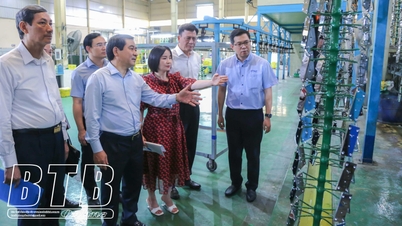








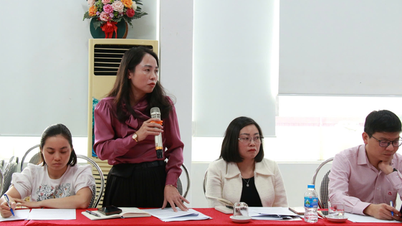

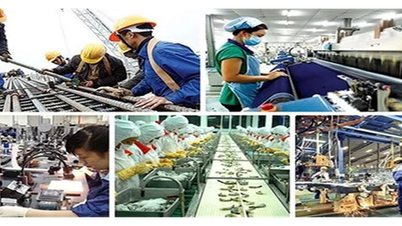








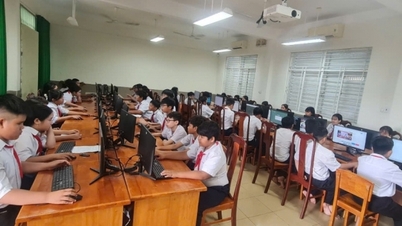
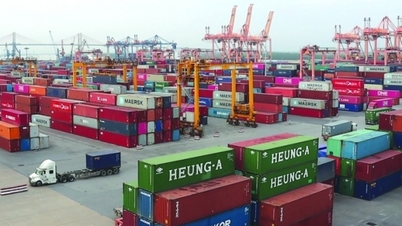
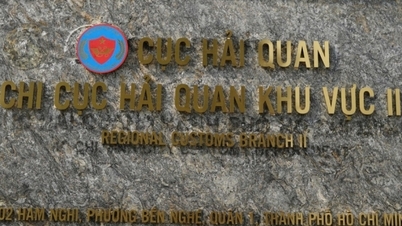
![[Photo] Prime Minister Pham Minh Chinh inspects the progress of the National Exhibition and Fair Center project](https://vphoto.vietnam.vn/thumb/1200x675/vietnam/resource/IMAGE/2025/5/19/35189ac8807140d897ad2b7d2583fbae)



















































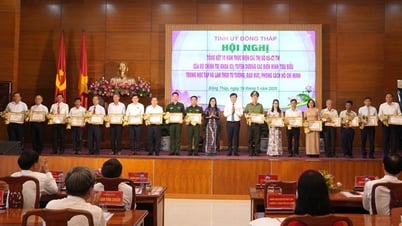
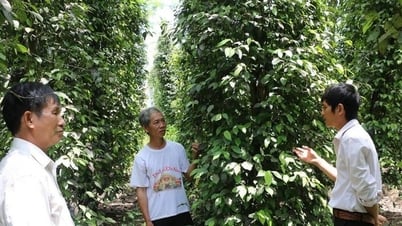

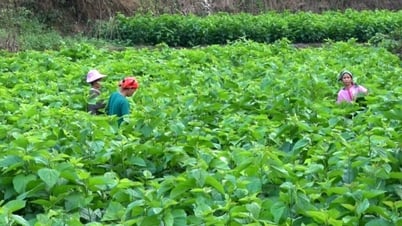






![[VIDEO] - Enhancing the value of Quang Nam OCOP products through trade connections](https://vphoto.vietnam.vn/thumb/402x226/vietnam/resource/IMAGE/2025/5/17/5be5b5fff1f14914986fad159097a677)



Comment (0)